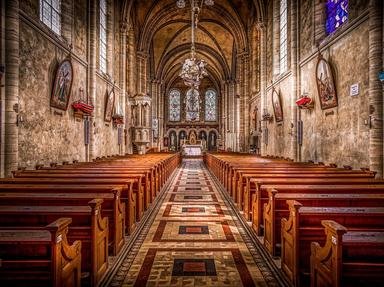Quiz Answer Key and Fun Facts
1. According to the Catholic Church, which of these is NOT a Fruit of the Holy Spirit?
2. The Church teaches that Catholics commit a mortal sin when they get married by the Justice of the Peace.
3. Which of these is not one of the three chief kinds of sacramentals?
4. Which Catholic prayer begins, "O my God, relying on Thy almighty power and infinite mercy and promises..."?
5. Which of these is NOT a way Catholics honor the saints?
6. If a father tells a girl that she may not become a nun, but she has a religious vocation, does the Catholic Church teach that she would sin by becoming a nun anyway?
7. If you die in the state of a mortal sin, where do Catholics believe that you go?
8. According to the Catholic Church, is it idol worship if you pray to Mary or the saints?
9. If you are distracted during prayer, is it okay to want to think of those distractions because it is too hard to focus?
10. What is the 6th Station of the Way of the Cross?
11. How often does the Catholic Church say you MUST you go to Confession?
12. The Sixth Commandment (as listed by Catholics) only forbids adultery.
13. Who said: "Behold the handmaid of the Lord. Be it done unto me according to Your Will"?
14. In the Catholic Church, how is a Sacrament related to God's grace?
15. The Catholic Church teaches that teen girls who hang out with teen boys, and teen boys who hang out with teen girls, are not in danger of committing impure sins together as long as they have no bad intentions.
16. Which of these does the Third Commandment (keeping the Sabbath holy) forbid?
17. What is sacrilege?
18. What do Catholics call the Judgment which we will receive immediately after death?
19. Why do Catholics call some sins "capital sins"?
20. What quality of the Church means that the Church will last until the end of time?
Source: Author
catherine6
This quiz was reviewed by FunTrivia editor
ArleneRimmer before going online.
Any errors found in FunTrivia content are routinely corrected through our feedback system.

